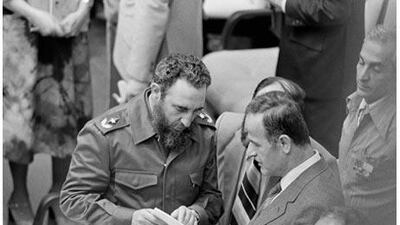Cairo // The Non-Aligned Movement (Nam) is in a state of "crisis", with some member states questioning whether the "raison d'être" of the movement has "disappeared" said Robert Mugabe, the president of Zimbabwe, in an address to Nam delegates. That was in 1992, during the first Nam summit to follow the collapse of the Soviet Union. But if the world has changed dramatically since then, the fundamental challenge that faces the movement, which was established in 1961 as a forum for countries that considered themselves independent of the Cold War superpowers, has remained the same. This week, nearly 17 years after Mr Mugabe's statements, delegates to the 15th Nam summit in Sharm El Sheikh, Egypt, will address the same question once again: is the Non-Aligned Movement still relevant? "The Nam definitely is having some sort of identity crisis in a sense," said Gamal Abdel Gawad, a security analyst at the Al Ahram Centre for Political and Strategic Studies in Cairo. But the changing political landscape, said Mr Gawad, does not have to make the Nam obsolete. "It still needs to fully transform itself to a movement with a mandate such as raising economic issues: globalisation, international trade, protectionism, access to markets, foreign direct investment - all those things now are the main concerns," he said. "The old agenda of non-alignment is somewhat obsolete even though we are not living in a kind of great world with no confrontations or hostilities. But definitely the Cold War time is over." But even in its capacity as a forum for the economic concerns of the world's poorest economies, the Nam has recently been overshadowed. Consider the Group of 8 nations, an elite club of the world's richest that was founded in the 1970s. With the fall of Communism and the rapid rise of industrialising giants such as India, China and Brazil, the small club has expanded. At its 35th meeting last week in Italy, 40 countries sent representatives. Nevertheless, of the wealthy and getting-wealthier nations that now comprise the G20, only four are also represented among the 118 members of the non-aligned movement. If those countries use their audience with the global political playmakers in the G8 to only represent their own interests, said Mr Gawad, then the Nam's usefulness as a forum may fade. But if countries such as India, Indonesia, South Africa and Saudi Arabia use their growing power to speak for the entire developing world, then the Nam may retain its relevance as a forum. "This is the only place where developing nations - all developing nations - can sit together and discuss their concerns," said Mr Gawad. "Those 'graduated' nations cannot claim representation of all developing countries if there isn't a broader organisation that brings all developing nations together. Here, I think the non-aligned movement could perform this function." This week's meeting, which opens on Wednesday and will conclude the following day, will offer yet another forum to address many of the same issues that have made international headlines over the past several years: the impact of the global financial crisis on the world's poorest countries; the spread of global pandemics such as bird and swine flu; global climate change and conflict in the Middle East. The meeting will also see the passing of the movement's leadership from Cuba's president, Raoul Castro, to Hosni Mubarak, the president of Egypt. The new leadership represents a kind of homecoming for the organisation, which was founded in part by Gamal Abdel Nasser, the former Egyptian president, as a means for the world's poorest countries to express their views outside of the polarising Cold War alliances established by the United States and the Soviet Union. Nasser was joined by India's Jawaharlal Nehru and Yugoslavia's Josip Tito, whose outspoken rejection of colonialism and the Cold War proxy politics that characterised global diplomacy during much of the second half of the 20th century made them heroes throughout the developing world. And it was with those Cold War-era issues, said Abdel al Raouf al Reedy, a former Egyptian ambassador to the United States, that the Nam first triumphed. At the time of its founding, the group emerged as a moral conscience on South Africa's racist apartheid regime and the continuing colonial presence in Africa and Asia. The group acted as a champion for the majority of the world's population with whom the major powers fought their proxy wars. Those victories are what continue to empower the organisation today, said Mr Reedy. "No one expects the non-aligned movement to solve any problems," he said. "It is relevant as a forum. As a moral force in the world, where developing countries from all over the world can get together and express their collective opinions about the major issues that are affecting them." Most of those problems have been resolved, as have the Cold War power dynamics that sustained them. Now, said Mohammed Abdel Salem, a researcher at the Al Ahram Centre, Nam has already begun to focus on articulating the economic plight of the developing world, even as a few of its members surge forward. The changing times have also called for a new vocabulary. No longer split between the Communist East and the capitalist West, Nam now fashions itself as the voice of the "Global South". "Now we have North and South. I think that the Non-Aligned Movement is the representative of the South nowadays in another kind of global system," said Mr Salem. "Most of the issues or topics that have been raised in the meeting have tended to be globalised. They were talking about climate change, poverty, relationships between all of the states in the world. So it represents the opinion of the South in this global era." mbradley@thenational.ae

Delegates to summit question relevance
The 118 member states ponder its future as a platform for discussion of the economic concerns of the world's poorest countries.
Most popular today
